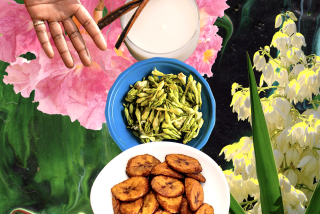Long Ago, Before the Wars ...
- Share via
The school year had just started, and I was new to Liberia. I looked down the class list and my eyes settled on the name Nehemiah Monger. I asked Monger to explain a point on property law. Monger started speaking in such heavily accented English I couldn’t grasp his point. I started to sweat. Rather than admit my predicament, I asked another student if he agreed with Monger.
“I’m not sure,” Charles Padmore replied.
“Why not, Mr. Padmore?”
“Frankly, I didn’t understand a word he said.”
And there, in microcosm, were Liberia’s two societies. Padmore was an Americo Liberian, a descendant of freed American slaves, the small minority that ran the country since the early 19th century. Monger was a tribal African, a group that makes up 95% of the population. Padmore had gone abroad for college, while Monger had an “upcountry” education.
The founders of Liberia -- the Americo Liberians -- brought with them some of the worst attitudes of the antebellum South. They built plantation-style houses, dressed in formal attire despite the steamy weather, referred to each other as “Honorable” and avoided manual labor by exploiting the “natives” in forced labor schemes. In the 1950s, the Liberian government tried to counteract these tendencies with a “unification policy” aimed at enfranchising the tribal population and giving it economic opportunity. The policy enjoyed only limited success, but it did bring students like Monger to the law school.
It was 1965 when I arrived in Liberia. After a few years of practicing law on Wall Street, I had been bored and wanted a change. So I signed a two-year contract to teach law at the University of Liberia’s new law school.
The school consisted of two offices, four classrooms and a 3,000-book library on the ground floor of Roberts Hall. The only air conditioning was in the law library, where the books would have turned green from mildew without it. Student enrollment was less than 50.
Liberia had adopted the American common law, and the law school used an American-style curriculum -- so it wasn’t hard for me to get my bearings. I taught from American legal texts, modified by any Liberian cases and statutes I could find. The statutes were easy, thanks to Milton Konvitz of Cornell University Law School. In 1956 he collected, arranged, indexed and published all the Liberian laws then in force. But often I had to track down court decisions, which I mimeographed and passed out in class.
My two years in Liberia were a mix of hard work and fun. I met many charming and well-educated Liberians, and there was a large expatriate community of bankers, businessmen, Peace Corps volunteers and foreign aid workers.
Parts of the city were almost glitzy. Mamba Point was dotted with villas and foreign embassies with stunning views of the Atlantic. Dance parties at the Ducor Intercontinental echoed to the beat of the West African high life. Not far from the Ducor was a modern downtown centered on Broad Street. The nightspots were one street over on (well-named) Gurley Street. Sundays were spent on the beautiful white sand beaches close to Monrovia.
The law school’s achievements -- the law journal, the training program for new judges and magistrates and the graduation of an impressive crop of new lawyers -- now seem almost ridiculous in the wake of the devastation that has since ripped Liberia.
In 1980, Master Sgt. Samuel Doe seized power and replaced Liberia’s Constitution, drafted by a 19th century Harvard law professor, with the modern African tradition of delivering political power from the barrel of a gun. In 1990, Liberia’s civil war burst into the capital city, and the university became a battlefield. “The combatants seemed determined to destroy not just Liberia, but also its mind and soul,” former University of Liberia President Patrick Seyon said.
Today, the university and law school bear the scars of war but have not succumbed. Seniors graduated in May, and a new school year is about to begin.
In the past, Liberian cease-fires have only served as a prelude for more fighting. This time, Liberians hope and pray the madness is over.
I think back to the Sunday morning long ago when I was driving upcountry on dusty laterite roads. I was hot, lost and late. I saw a Liberian walking along the road, carrying an umbrella to shield himself from the bright sun. I braked fiercely and yelled:
“How do I get to Bomi Hills from here?”
The man was about 55, which then seemed very old to me, and he wore a white shirt, gray slacks and carried a Bible. He looked at me carefully, ignoring the cloud of laterite dust I had stirred up that was settling on his clothes. A smile creased his face.
“I will tell you, sir,” he finally said. “But in this country, we always say ‘Good morning’ first.”
For Liberia, we wish a bright new day.
Gerald Zarr, a consultant on international development, lives in Bethesda, Md.
More to Read
Sign up for Essential California
The most important California stories and recommendations in your inbox every morning.
You may occasionally receive promotional content from the Los Angeles Times.









